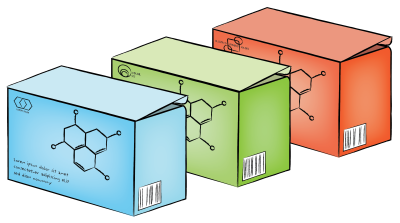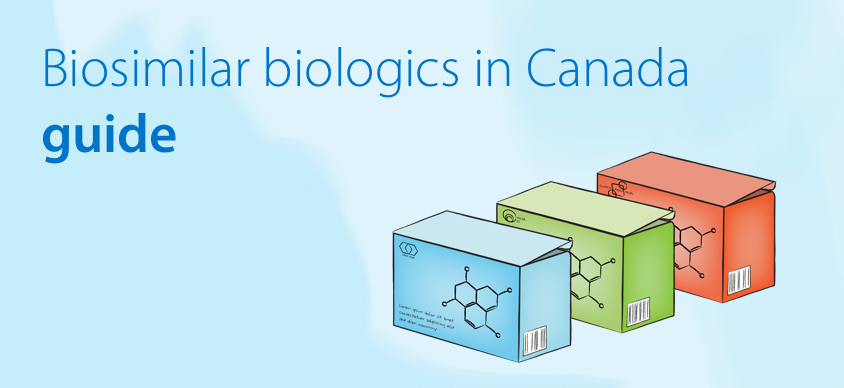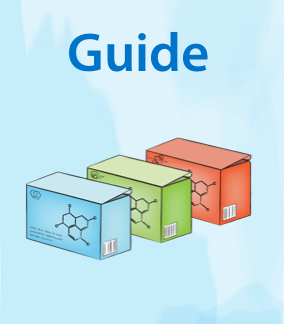
Biologic medications have been a treatment option for patients with inflammatory arthritis over the past 24 years. Today, there are biosimilar biologic ("biosimilar") versions of originator biologic ("originator") medicines that have lost patent protection. To receive Health Canada's approval, a biosimilar must demonstrate that it is highly similar and has no clinically meaningful differences in safety and efficacy compared to the originator.[1]
A biosimilar is typically prescribed to patients by a rheumatologist. For example:
adalimumab (Abrilada®), adalimumab (Amgevita®), adalimumab (Hadlima®), adalimumab (Hulio®), adalimumab (Hyrimoz®), adalimumab (Idacio®), adalimumab (Simlandi®), and adalimumab (Yuflyma®) are biosimilar versions of the originator adalimumab (Humira®).
etanercept (Brenzys®), etanercept (Erelzi®), and etanercept (Rymti®) are biosimilar versions of the originator etanercept (Enbrel®).
infliximab (Avsola®), infliximab (Inflectra®), infliximab (Renflexis®), and infliximab (Remsima®SC) are biosimilar versions of the originator infliximab (Remicade®).
rituximab (Riabni®), rituximab (Riximyo®), rituximab (Ruxience®), and rituximab (Truxima®) are biosimilar versions of the originator rituximab (Rituxan®).
- ustekinumab (Jamteki®) and ustekinumab (Wezlana®) are biosimilar versions of the originator ustekinumab (Stelara®).

Biosimilars are not generics of their originators.
Biosimilars are similar, but not the same, as their originators.
Biosimilars have been approved for use in Canada since 2009, and for use in inflammatory arthritis since 2014. There are currently 55 biosimilars approved by Health Canada. The European Union (EU) approved the first biosimilar in 2006 and today totals 88 approved biosimilars. The evidence acquired over ten years of clinical experience shows that biosimilars approved through European Medicines Agency can be used as safely and effectively in all their approved indications as other biological medicines.[2]
Based on this scientific evidence and real-world data, rheumatologists across Canada are now regularly prescribing biosimilars for inflammatory arthritis patients newly initiated on adalimumab, infliximab, etanercept, rituximab and ustekinumab; and in full consultation with their patients, transitioning them from the originator biologic to its biosimilar.
Why have biosimilar biologics been developed and approved?
Why have biosimilar biologics been developed and approved?
Biologics are treatments that can help patients with serious diseases such as inflammatory arthritis, cancer, diabetes, inflammatory bowel disease, multiple sclerosis, psoriasis, and age-related macular degeneration. However, they are complex medications and can be very expensive and time consuming to develop. This can limit patients’ access to these medicines, and can make it difficult for the healthcare system to afford them. What does this mean for provincial drug plans? According to data from the Canadian Institute for Health Information, public drug program spending on biologic medicines reached $4.7 billion in 2022 (29.6% of total public drug program spending).[3] For the tenth consecutive year, anti-TNF biologic medicines used for rheumatoid arthritis and Crohn's disease accounted for the highest proportion of that public drug spending total.[4]
Biosimilars have the potential to improve patient access to biologics and save public and private healthcare systems billions of dollars now and over the coming years. A study commissioned by the Canadian Government’s Patented Medicine Prices Review Board (PMPRB) has estimated that private and public drug plans across Canada could save from $332 million CDN to $1.81 billion CDN in the third year following biosimilar entry across a portfolio of products.[5]
Why are biosimilar biologics less costly than originator biologics?
Why are biosimilar biologics less costly than originator biologics?
A manufacturer of biologics must spend many years studying a new biologic medicine before it can be approved in Canada. The company then holds a patent on the medicine that prevents other companies from selling that medicine. This allows the originator manufacturer to earn back the money it spent on bringing the medicine to market. When the patent of an originator expires, other manufacturers are allowed to make a biosimilar version of the medicine. Manufacturers that make biosimilars of other originator medicines do not have the same costs to bring the medicine to market and can therefore offer it at a lower price.[6]
What benefits do biosimilar biologics provide patients and our healthcare system?
What benefits do biosimilar biologics provide patients and our healthcare system?
Biosimilars create three main benefits to patients, the healthcare system, and society:
1. Savings from biosimilars use can modernize “special access criteria”. Currently, patients must try and fail treatment on older, less expensive medications. Because biosimilars are significantly less expensive, public and private drug plans can remove the need for patients to fail on these older therapies before approving reimbursement for biosimilars.
2. Savings from biosimilars use can be reinvested into public and private drug plan budgets making it possible to improve the sustainability of their drug plans by adding new medication listings and boosting existing medicine coverage for patients.
3. Savings from biosimilars can be invested into non-medication elements of care that patients need, such as specialized nursing, counselling and physio- and occupational therapy.
References
[1] Health Canada Biosimilars Fact Sheet
[2] European Medicines Agency - Biosimilar medicines: Overview
https://www.ema.europa.eu/en/human-regulatory-overview/biosimilar-medicines-overview
[3] Canadian Institute for Health Information. Prescribed Drug Spending in Canada, 2022. CIHI; 2023. [infographic]
https://www.cihi.ca/en/prescribed-drug-spending-in-Canada-2023
[4] Canadian Institute for Health Information. Prescribed Drug Spending in Canada, 2021. CIHI; 2022. [infographic]
https://www.cihi.ca/en/prescribed-drug-spending-in-canada
[5] The Patented Medicines Prices Review Board, Government of Canada. Potential Savings from Biosimilar in Canada poster.
http://www.pmprb-cepmb.gc.ca/CMFiles/NPDUIS/2017_Conference_Posters/post_6_biosim.pdf
[6] Canadian Agency for Drugs and Technologies in Health (CADTH): Biosimilar Drugs: Your Questions Answered
https://www.cadth.ca/sites/default/files/pdf/biosimilar_drugs_patient_en.pdf
Biosimilar biologics FAQs
What is a biologic?
Today in North America, Europe, and Asia, there are more biologics – originators and biosimilars – in use to treat inflammatory arthritis than in any other disease.
Over the past 24 years, biologics have become a life-saving treatment option for patients with serious chronic disease, including inflammatory arthritis patients, whose disease does not respond to conventional synthetic disease-modifying anti-rheumatic drugs (csDMARDs) such as methotrexate, hydroxychloroquine or sulfasalazine.
Biologics are made from living organisms like yeast and bacteria. The first version of a biologic developed is known as the "originator". This is because they are the original version of a drug that a biosimilar is based on. Biologics are much larger and more complex in nature than conventional, small molecule medicines such as over-the-counter ibuprofen (e.g. Advil) or by-prescription methotrexate. Biologics are administered in two ways; by self-injection under the skin or into muscle, or by intravenous (IV) infusion into a vein in the hand, wrist or arm.

What is a biosimilar biologic?
As patents expire for originator medicines, other manufacturers may produce new, similar versions shown to be as safe and effective. These new versions are called biosimilars.[1] Since the originator drugs are large and complex, biosimilars can be highly similar, but not identical.
Biosimilars have been approved for use in Canada since 2009 and for use in inflammatory arthritis since 2014. Fifty-five biosimilars are currently approved by Health Canada.
Are biosimilar biologics generic biologics?
Generic medications are copies of brand-name medications, have the same active ingredient, and are the same as those brand name medications in dosage form, safety, strength, route of administration, quality, performance characteristics and intended use.
Biosimilars, like generic medications, are lower priced versions of brand name ("originator") medicines. Originator biologics have already set the foundation of research and development for biosimilars, which means biosimilars are more cost-effective to produce and lead to similar outcomes. But biosimilars are not the same as generic medicines because unlike non-biological medicines, biologics are often large and complex and cannot be exactly copied.
There are very small differences between different batches of an originator biologic. This is because they are made using living organisms with some tiny natural differences. The same goes for the slight differences between a biosimilar and its originator, which are also not clinically meaningful.
What is immunogenicity?
The immune system has evolved to recognize foreign proteins in the body. Biologics are usually injected into the body and the immune system often reacts to them. This reaction is referred to as the immunogenicity of the product. Sometimes, immunogenicity can only be detected using sophisticated laboratory tests and has no impact on the patient. In other cases, immunogenicity can impact patient safety or how well the medication works. For these reasons, studies showing that there are no clinically meaningful differences in immunogenicity between the biosimilar and originator are required for approval of a biosimilar. In addition, biosimilar manufacturers are responsible for monitoring the immunogenicity potential of the biosimilar after it is used in Canada.[1]
[1] Health Canada: Biosimilar biologic drugs in Canada: Fact Sheet - Immunogenicity and how we address it for biosimilars
https://www.canada.ca/en/health-canada/services/drugs-health-products/biologics-radiopharmaceuticals-genetic-therapies/applications-submissions/guidance-documents/fact-sheet-biosimilars.html#a9What is interchangeability?
In Canada, interchangeability often refers to the ability for a patient to be changed from one drug to another equivalent drug by a pharmacist, without the intervention of the doctor who wrote the prescription when it has been deemed interchangeable by a Provincial or Territorial regulatory body. This is a common practice for drugs that are off patent and have been deemed interchangeable with their generic equivalent.
Health Canada has declared biosimilars not to be interchangeable with their originator. Health Canada's approval of a biosimilar is independent of provincial, territorial, or private drug plan decisions regarding its formulary listing and reimbursement or any decision as to interchangeability between these medications. According to the new guidance from Health Canada, interchangeability decisions rest with provincial or territorial governments. They also regulate pharmacy substitution practices.
What does “transitioning” or “switching” mean?
Transitioning” or “switching” means a patient is moved from one medication to another. In the case of biologics, there are two types of transitions:
“Medical transition” occurs in the case of a patient not doing well on their current originator biologic or biosimilar biologic who is transitioned to another originator or biosimilar, based on a decision by the patient and their rheumatologist, in order to regain maximum disease control.
“Policy transition” (sometimes referred to as “non-medical switching”) occurs when a public or private drug plan’s reimbursement policy necessitate patients move from their current originator biologic to its biosimilar biologic.
Are patients being transitioned to biosimilar biologics in Canada?
For the past eight years, provincial drug plans across Canada have listed biosimilar brands ahead of originators for treatment-naïve patients (patients who have not previously received the originator). Since 2019, provincial and territorial drug plans, including Ontario, British Columbia, Quebec, Alberta, New Brunswick, Nova Scotia, Northwest Territories, Saskatchewan, Newfoundland and Labrador, Yukon, and Prince Edward Island have also begun implementing policies that transition patients from an originator to an equally safe and effective biosimilar approved by Health Canada.[1]
In the context of biosimilar use, Health Canada considers “switching between authorized products to refer to a change from routine use of one specific product to routine use of another specific product. Patients and health care providers can have confidence that biosimilars are effective and safe for each of their authorized indications. No differences are expected in efficacy and safety following a change in routine use between a biosimilar and its reference biologic drug in an authorized indication.”[2]
Under a transition policy, patients have a certain period to discuss with their prescriber transitioning from an originator to a biosimilar and get a prescription for the biosimilar to keep their drug plan coverage. Patients unable to transition to the biosimilar for medical reasons can make exceptional requests for continued coverage of the originator.
Prior to transitioning, both physicians and their patients must be fully informed and have all available information about the biosimilar medicine, such as details about the reimbursement policy, patient support program information, including contact names and phone numbers.
[1] BC Biosimilars Initiative for Patients
https://news.gov.bc.ca/releases/2019HLTH0080-001072
Alberta Blue Cross: Government Sponsored Biosimilars Initiative
https://www.ab.bluecross.ca/government-plan/biosimilar-initiative.php
New Brunswick Biosimilars Initiative
Government of Quebec: Prescription Drug Insurance – Coverage of Biosimilar Drugs
https://www.ramq.gouv.qc.ca/en/citizens/prescription-drug-insurance/know-conditions-coverage
Northwest Territories Biosimilar Initiative
https://www.hss.gov.nt.ca/en/services/biosimilar-initiative
Nova Scotia biosimilars initiative
https://novascotia.ca/news/release/?id=20220204002
Saskatchewan Biosimilars Initiative
News Release: Ontario Expanding Safe Use of Biosimilars
https://news.ontario.ca/en/release/1002611/ontario-expanding-safe-use-of-biosimilars
NLPDP Biosimilar Initiative website
https://www.gov.nl.ca/hcs/prescription/biosimilars/
News Release: Yukon government enhances public drug plan with biosimilars
https://yukon.ca/en/news/yukon-government-enhances-public-drug-plan-biosimilars
News Release: PEI expanding safe use of Biosimilars
https://www.princeedwardisland.ca/en/news/pei-expanding-safe-use-of-biosimilars
[2] Health Canada Fact Sheet on Biosimilars: Switching
Health Canada’s position on transitioning
In the context of biosimilar use, Health Canada considers transitioning or “switching between authorized products to refer to a change from routine use of one specific product to routine use of another specific product. Patients and health care providers can have confidence that biosimilars are effective and safe for each of their authorized indications. No differences are expected in efficacy and safety following a change in routine use between a biosimilar and its reference biologic drug in an authorized indication.”[1]
What is the NOCEBO effect?
Transitioning patients from originator biologics to biosimilar biologics is associated with the potential for a “nocebo” effect, a phenomenon that occurs when a patient’s negative expectation causes a treatment to have a more negative effect than it otherwise would—essentially, the opposite of the placebo effect.
The way in which rheumatologists and other health care providers communicate with patients about transitioning to a biosimilar is key to preventing the nocebo effect. Patients should be informed about the transition well in advance and the availability of research-based information is important for patient understanding and empowerment. Finally, an appointment with a rheumatologist to discuss biosimilar transitioning should ideally allow enough time for the patient to understand the concept of biosimilars and transitioning and to address any concerns properly.
What is extrapolation?
Because of the way biosimilars are developed, it is not always necessary to carry out clinical studies with the biosimilar in all the diseases for which the originator has been shown to work. Instead, it may be possible to extend safety and efficacy data from studies in one disease to cover others. This is known as extrapolation or extension of indications. An indication is a term that means the use of a medicine to treat a specific disease. Many biologic medicines are approved for more than one indication.
Because a biosimilar is very similar in structure and function to an originator with proven safety and efficacy, clinical studies do not need to be repeated for each indication.
Patients and physicians can have confidence in the use of a biosimilar in each indication approved by Health Canada.
Share facts about biosimilars
With an evidence-based understanding of biosimilars, patients can have a full therapy conversation with their rheumatologist (or other specialist) to decide on their choice of medication, including originator biologic or biosimilar biologic.
Share this biosimilars facts page with another patient, with your health care professional, your family or anyone else you know who are having a biosimilars conversation with.
Share facts about biosimilars
With an evidence-based understanding of biosimilars, patients can have a full therapy conversation with their rheumatologist (or other specialist) to decide on their choice of medication, including originator biologic or biosimilar biologic.
Share this biosimilars facts page with another patient, with your healthcare professional, your family or anyone else you are having a biosimilars conversation with.

Arthritis Consumer Experts
© 2024

ACE thanks Arthritis Research Canada (ARC) for its scientific review of ACE and JointHealthTM information and programs.

Arthritis Consumer Experts
© 2000-2021

ACE thanks Arthritis Research Canada (ARC) for its scientific review of ACE and JointHealthTM information and programs.


Arthritis Consumer Experts
© 2000-2021

ACE thanks Arthritis Research Canada (ARC) for its scientific review of ACE and JointHealthTM information and programs.














